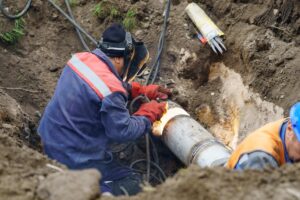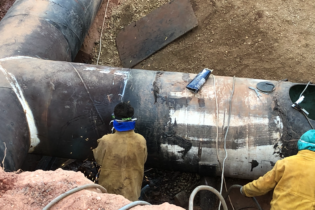One of the major factors that play a significant role in the economy is the basic supply of electricity and water.
To maintain this supply, welding is a critical part of the maintenance chain that must be carried out at an acceptable standard using competent personnel but a lack of welding coordinators is putting huge strain on the system. CEO of the Southern African Institute of Welding (SAIW) Certification, Herman Potgieter says it’s vital to have the knowledge and know-how to maintain safety-critical products such as boiler units at power plants and municipal water pipe infrastructure. “Every power station and the municipal department responsible for critical infrastructure installation and maintenance needs ISO 3834 welding coordination personnel to ensure compliance with specific codes and standard requirements. “Welding coordination specialists are vital as they provide a broader, more strategic view of the welding function and thereby ensure that it is properly leveraged within a particular company or site. Unfortunately, 90% of companies make use of inspection personnel to coordinate activities. Inspector and Co-Ordinator roles are often seen as the same but each has a very important and distinct part to play.” The SAIW is therefore working hard to up the current in-depth welding skills via its welding coordination courses. “We realise that many welders want to further their skills set but lack the time to do so. To enhance the accessibility of these courses, we offer our IWS qualification courses as live after-hours online sessions and in-house face-to-face learning opportunities. We also offer this hybrid approach to fast-track Level 2 inspectors so that existing welders can complete the IWS qualification with a short bridging course This hybrid approach ensures accessibility and enhanced learning opportunities for employed students with limited time availability,” Potgieter reports A continental approachThe SAIW is also working across Africa to foster this capability having entered into a partnership with Ethiopia’s tertiary education sector to impart in-depth welding, inspection and coordination skills across 9 TVET Colleges in that country. In addition, the SAIW is championing ISO 3834 welding standards across the African continent in partnership with the African Welding Federation. This stems from the requirement for ISO 3834 certified companies to employ Responsible Welding Co-ordinators (RWCs).
SAIW Executive Director John Tarboton says; “We are encouraging companies to train their RWCs on the IIW welding qualifications given the contribution that our ISO 3834 and specific welding coordination ISO 14731 training can make to developing and stimulating welding capabilities in Africa. The idea is that as we roll out ISO 3834 certified companies across Africa and this will stimulate demand for the training of International Welding Practitioners (IWP) International Welding Specialists (IWS) and International Welding Technologists (IWT) training.” The SAIW’s work with Ethiopian welders and welding coordination personnel will see five Ethiopian engineers coming to South Africa to complete the IIW International Welding Inspection Personnel (IWIP) Comprehensive Course at the SAIW’s Johannesburg campus in April 2022. This course will provide them with extensive knowledge of welding and inspection theory and application. They will then be able to offer the same course at accredited Ethiopian Training Bodies. Training the trainers This will be followed by SAIW Certification staff travelling to Ethiopia in June to conduct an audit of the first of nine TVET Colleges to be certified Approved Training Bodies (ATBs) under the SAIW (South Africa ‘s IIW Authorised National Body) after which they will have the authority to issue certificates post each welding co-ordination course. SAIW staff will also ‘train the trainers’ by upskilling an additional 100 Ethiopian welding practitioners through the International Welding Practitioner (IWP) course at The Centre of Excellency for Engineering in the Ethiopian capital Addis Ababa. These students will in turn become instructors at the nine accredited TVET colleges in Ethiopia, mentioned above. The IWP programme provides a combination of theoretical knowledge and high-level practical skills assessed by tests of increasing difficulty and by theoretical examinations. Additional training of 500 students is planned for the second half of 2022 to ultimately train 7 000 students as internationally recognised welders. The Ethiopian programme is a prime example of how deepening the welding skills base is as key part of boosting economic growth. Tarboton stresses; “If we want to position Africa as a centre of welding excellence, we need to develop a deeper more comprehensive welding capacity by offering courses that provide specialist welding inspection and co-ordination skills to ensure ISO 3834 company compliance as well as career progression and enhanced earning potential.”






